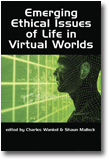
Emerging Ethical Issues of Life in Virtual Worlds
Edited by:
Charles Wankel, St. John's University, New York
Shaun Malleck, University of California, Irvine
Published 2010
Virtual Worlds are being increasingly used in business and education. With each day more people are venturing into computer generated online persistent worlds such as Second Life for increasingly diverse reasons such as commerce, education, research, and entertainment. This book explores the emerging ethical issues associated with these novel environments for human interaction and cutting-edge approaches to these new ethical problems. This volume’s goal is to put forward a number of these virtual world ethical issues of which research is only commencing. The developing literature specifically regarding virtual world ethics is a recent phenomenon. Research based on the phenomenon of virtual world life has only been developing in the past four years. This volume introduces pathbreaking work in a field which is only just beginning to take shape. It is ideal as both as a library reference and a supplementary text in upper-division courses focused on the issues of applied ethics and new media. It is unique in being one of the first volumes specifically addressed to ethical problems of the “metaverse”.
This volume includes articles from authors from around the world exploring topics such as: employing rationalist and casuistic approaches to the controversial topic of “virtual rape” yield an increased understanding of how virtual worlds ought to be designed, the relationship between the ethical and legal dimensions of virtual world users’ participation in “paratexts”, utilitarian consideration of harm and freedom in the case of virtual pedophilia, norms of research ethics in virtual worlds, the ethical implications of employing virtual worlds as tools for medical education and experimenting with healthcare services, the ethics of the collective action of virtual world communities, consideration of the virtue and potential of cosmopolitanism in virtual worlds, Deleuzian ethical approaches to the experience of the disabled in virtual worlds, the ethics of virtual world design, and the ethical implications of the “illusion of reality” presented by virtual worlds.
CONTENTS
Editorial Review Board. Exploring New Ethical Issues in the Virtual Worlds of the Twenty-First Century, James A. F. Stoner & Charles Wankel. The Neglect of Reason: A Plea for Rationalist Accounts of the Effects of Virtual Violence, Johnny Hartz Søraker. Copyright and Paratext in Computer Gaming, Dan L. Burk. Virtual Sex With Child Avatars, A. A. Adams. Research Ethics and Virtual Worlds, Justin M. Grimes, Kenneth R. Fleischmann & Paul T. Jaeger. Preparing for Practice: Issues in Virtual Medical Education, Rachel H. Ellaway & David Topps. Achieving Collective Competence in Emergent Virtual World Organizations: A Case Study of Peace Train—a Charitable Organization in Second Life, Robin Teigland. Cosmopolitanism Online: A Manual for the Construction of a Virtual Cosmopolis, Edward Howlett Spence & Adam Briggle. Ethics in Second Life: Difference, Desire, and the Production of Subjectivity, Anna Hickey-Moody & Denise Wood. This War is a Lie: Ethical Implications of Massively Multiplayer Online Game Design, Miguel Sicart. The Illusion of Reality: Cognitive Aspects and Ethical Drawbacks: The Case of Second Life, Elena Pasquinelli. About the Authors.
-
Paperback978-1-60752-377-2
Web price: $45.04 (Reg. 52.99)
-
Hardcover978-1-60752-378-9
Web price: $80.74 (Reg. 94.99)
- eBook9781607523796

- BUS041000 - BUSINESS & ECONOMICS: Management
- BUS008000 - BUSINESS & ECONOMICS: Business Ethics
- BUS030000 - BUSINESS & ECONOMICS: Human Resources & Personnel Management
-
 Dark and Destructive Leadership
Dark and Destructive Leadership
-
 Digital Transformation
Organizational Challenges and Management Transformation Methods
Digital Transformation
Organizational Challenges and Management Transformation Methods
-
 Diversity, Equity, and Inclusion Insights in Practice
Diversity, Equity, and Inclusion Insights in Practice
-
 Human Resource (Talent) Development
Human Resource (Talent) Development
-
 Management Consulting in the Era of the Digital Organization
Management Consulting in the Era of the Digital Organization
-
 Perspectives on Race in Organizations
Perspectives on Race in Organizations
-
 The Entrepreneurship SIG at the European Academy of Management
Setting the Base for Tomorrow's Challenges
The Entrepreneurship SIG at the European Academy of Management
Setting the Base for Tomorrow's Challenges

